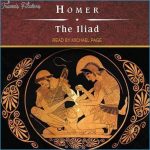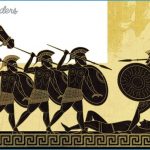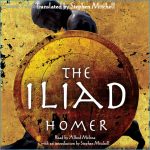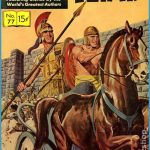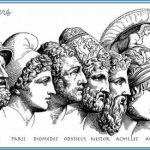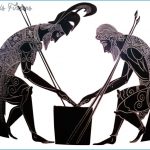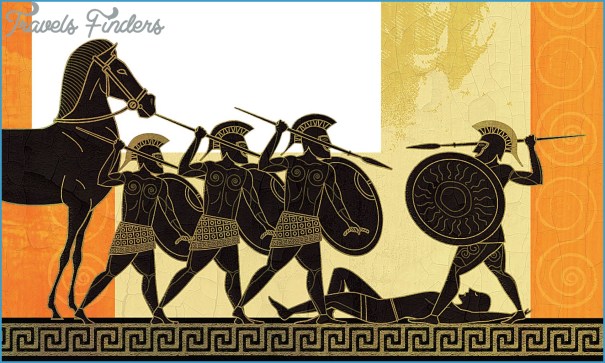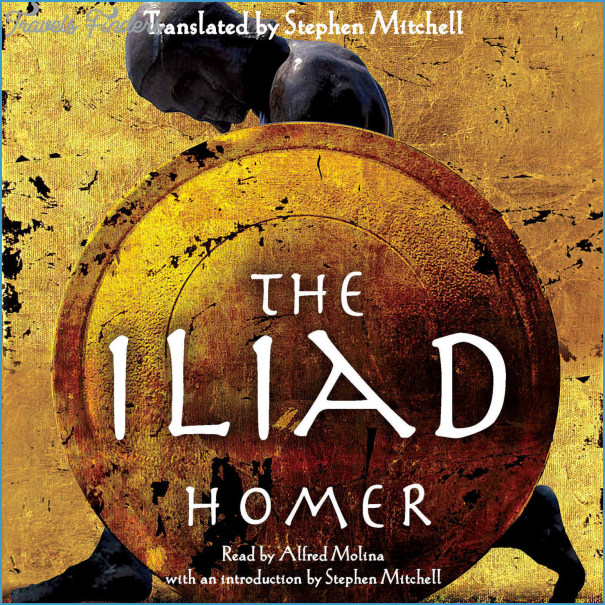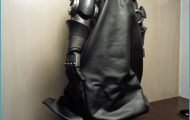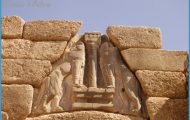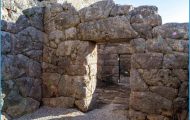In the tenth year hostilities broke out in earnest. But there was further internal conflict in the Greek camp. Angered by Agamemnon’s refusal to restore the captured daughter of Chryses, his priest, to her father, Apollo sent a plague against the Greeks, lifting it only after they complied. But when, as compensation, Agamemnon took Achilles slave girl, Briseis, Achilles refused to fight. Instead, with his comrade Patroclus, he sulked in his tent, singing moodily of the famous deeds of men.
Achilles absence encouraged the Trojans. Even Paris swaggered in the front line:
Draped across his shoulders was a panther skin, and buckled fast a sword and quiver. In his hand he shook two spears, bronze-headed, as he called out all the bravest of the Greeks to fight in single combat. When Menelaus, whom the war-god Ares loved, saw him striding out among the ranks, he delighted in his heart as a hungry lion delights to find a fallen carcass – an antlered stag or goat – and ravenously he tears at it, although swift dogs and eager huntsmen crowd around.
The outcome of this single combat between Paris and Menelaus was meant to end the war. But when Paris was wounded, Aphrodite intervened, wrapping him in mist and transporting him to his bedchamber. Battle was rejoined, and when more warriors were killed or wounded, even the gods took pity. So at the bidding of Apollo and Athene, Troy’s greatest champion, Hector, issued a challenge to the greatest of the Greeks to fight him He meant Achilles, but since he still refused to fight, Ajax took his place. When neither man won they agreed instead to exchange gifts. Ajax gave Hector his sword-belt; Hector gave Ajax his sword.
The Trojans were ascendant, but, when it was announced that their ally, the Thracian king Rhesus, was nearby with reinforcements, the fulfilment of another condition of their city’s capture helped seal their fate still tighter. A prophecy foretold that Troy could not fall if Rhesus horses drank from the River Scamander. So Odysseus and Diomedes, king of Argos, crept out by night, intercepted Rhesus, killed him and stole his horses.
But the next day Hector and the Trojans breached the Greek stockade, fanned out across the beach and torched the fleet. Achilles could stand by no longer. Still, though, he would not fight. Even when Agamemnon offered him great riches, he rebuffed him. Instead, he lent Patroclus his armour, and let him lead his men to battle. Unleashed, Patroclus slew Sarpedon, the son of Zeus, and chased the Trojans back inside their walls. But then Apollo intervened. He punched Patroclus so hard on his back that his helmet flew off, revealing his true identity. As Patroclus stood there stunned, Hector drove a spear through his belly.
The Iliad & Achilles’ Wrath Photo Gallery
As a lion defeats a tireless boar in battle, when they fight enraged on a high mountain ridge, each thirsting for a trickling spring; the boar snorts loud, but the lion defeats him with his strength.
Thus Hector, Priam’s son, deprived the brave Patroclus of life, although he had killed many, impaling him at close quarters with his spear.
Then he stripped Patroclus armour. Somehow the Greeks retrieved the body and brought it to Achilles. Racked with self-blame, he mourned his friend and promised retribution.
That night Sleep and Death flew down to Troy to claim Sarpedon’s corpse. Back home in Lycia he was buried with great honour. The same night, Thetis brought armour freshly fashioned by Hephaestus to Achilles tent. She had already warned her son that one of two destinies awaited him: either to grow old in Phthia, where his bravery would be forgotten; or to die at Troy and enjoy ‘unwithering fame. Achilles knew, too, that if he killed Hector, he would die soon afterwards. He did not care. He yearned only to avenge Patroclus.
Next day Achilles rejoined the fight. No one could resist him. Even the river-god Scamandrus felt his anger, as he wrestled vainly with Achilles to stop him reaching Troy. At last Achilles found Hector. For a moment they faced each other. Then Hector turned and fled. Close on his heels Achilles followed: ‘As a hawk high in the mountains, the fastest of all birds, swoops hard to catch a trembling dove; she flees from him, while he, shrieking shrilly, presses hard and his heart drives him on to snatch her. As the gods watched enthusiastically, Athene, disguised as Deiphobus, persuaded Hector to stand his ground. Hector launched his javelin.
He called to white-shielded Deiphobus, and asked for a long spear. But Deiphobus had vanished. And Hector understood and said, ‘The gods have called me out to die. I thought Deiphobus stood near me, but he is inside the walls, and Athene has deceived me. Now hateful death is close and there is no escape. I think this has long been the will of Zeus and of his son Apollo, who shoots from afar, who helped me until now with willing hearts. But now my share in life is over. ’
As Hector lay dying, his throat transfixed by a spear, he begged Achilles to return his body for burial. Instead, he tied Hector to his chariot with the sword-belt Ajax had once given him, and dragged the corpse around the walls of Troy before returning to his tent. Then he organized Patroclus funeral, with athletic games and sacrifices ; and every day he dragged Hector’s corpse three times around the funeral mound.
Devastated at the treatment of Hector’s body, Priam visited Achilles in his tent by night. With profound humanity and using simile to devastating effect, Homer relates how:
Great Priam clasped in his arms Achilles knees and kissed his hands, his terrible man-killing hands, that had slain so many of his sons. And just as blind infatuation [ate] grips a man, who kills another in his father’s house and so flees to a wealthy stranger’s home, and wonder seizes all who look on him, so was Achilles seized with wonder as he looked on godlike Priam
As Priam described his desolation at the loss of so many sons, imagining Achilles father Peleus in Phthia anxiously awaiting news, Achilles was moved to compassion. In a moment of sublime humanity both wept together for the tragedy of war. So Priam took his son’s body back to Troy and buried him.

